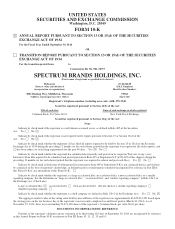Rayovac 2014 Annual Report Download - page 21
Download and view the complete annual report
Please find page 21 of the 2014 Rayovac annual report below. You can navigate through the pages in the report by either clicking on the pages listed below, or by using the keyword search tool below to find specific information within the annual report.If BDC does not agree to renew the license agreement, we have 18 months to transition out of the brand
name. No minimum royalty payments will be due during such transition period. BDC has agreed not to compete
in the four core product categories for a period of five years after the end of the transition period following
termination of the license agreement. Upon request, BDC may elect to extend the license to use the Black &
Decker brand to certain additional product categories. BDC has approved several extensions of the license to
additional categories and geographies.
Through the acquisition of the residential hardware and home improvement business (the “HHI Business”),
we own the patented SmartKey technology, which enables customers to easily rekey their locks without hiring a
locksmith.
On November 8, 2012, we acquired a 56% interest in Shaser Biosciences, Inc. Through this acquisition we
acquired patented technology that is used in our i-Light product line.
Competition
In our retail markets, we compete for limited shelf space and consumer acceptance. Factors influencing
product sales include brand name recognition, perceived quality, price, performance, product packaging, design
innovation, and consumer confidence and preferences as well as creative marketing, promotion and distribution
strategies.
The battery product category is highly competitive. Most consumer batteries manufactured throughout the
world are sold by one of four global companies: Spectrum Brands (manufacturer/seller of Rayovac and VARTA
brands); Energizer Holdings, Inc. (“Energizer”) (manufacturer/seller of the Energizer brand); The Procter &
Gamble Company (“Procter & Gamble”) (manufacturer/seller of the Duracell brand); and Matsushita
(manufacturer/seller of the Panasonic brand). We also face competition from the private label brands of major
retailers, particularly in Europe. The offering of private-label batteries by retailers may create pricing pressure in
the consumer battery market. Typically, private-label brands are not supported by advertising or promotion, and
retailers sell these private label offerings at prices below competing name-brands. The main barriers to entry for
new competitors are investment in technology research, cost of building manufacturing capacity and the expense
of building retail distribution channels and consumer brands.
In the U.S. alkaline battery category, the Rayovac brand is positioned as a value brand, which is typically
defined as a product that offers comparable performance at a lower price. In Europe, the VARTA brand is
competitively priced with other premium brands. In Latin America, where zinc carbon batteries outsell alkaline
batteries, the Rayovac brand is competitively priced. Our primary competitors in the portable lighting product
category are Energizer and Mag Instrument, Inc.
Competition within the hardware and home improvement industry varies based on location and product
segment. The main source of competition for residential locksets includes other third party manufacturers such as
Schlage, a division of Ingersoll-Rand, and private label import brands such as Defiant and Gatehouse. Major
competitors for hardware include The Hillman Group, Hampton Hardware, Crown Bolt and private label
competitors. In plumbing, Pfister’s major U.S. competitors are Masco, Fortune Brands, Kohler, and American
Standard, as well as Glacier Bay and AquaSource, and the private label brands of The Home Depot and Lowe’s.
The pet supplies product category is highly fragmented with over 500 manufacturers in the U.S. alone,
consisting primarily of small companies with limited product lines. Our largest competitors in this product
category are Mars Corporation (“Mars”), The Hartz Mountain Corporation (“Hartz”) and Central Garden & Pet
Company (“Central Garden & Pet”). Both Hartz and Central Garden & Pet sell a comprehensive line of pet
supplies and compete with a majority of the products we offer. Mars sells primarily aquatics products.
Products we sell in the home and garden product category face competition from The Scotts Miracle-Gro
Company (“Scotts Company”), which markets lawn and garden products under the Scotts, Ortho, Roundup,
9
























